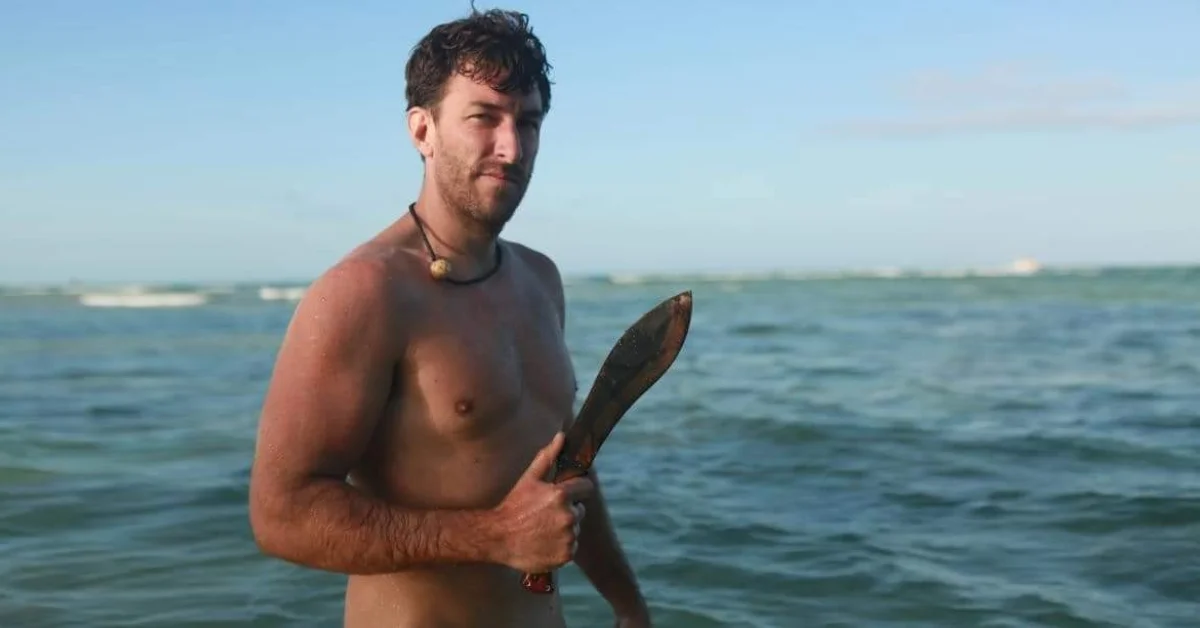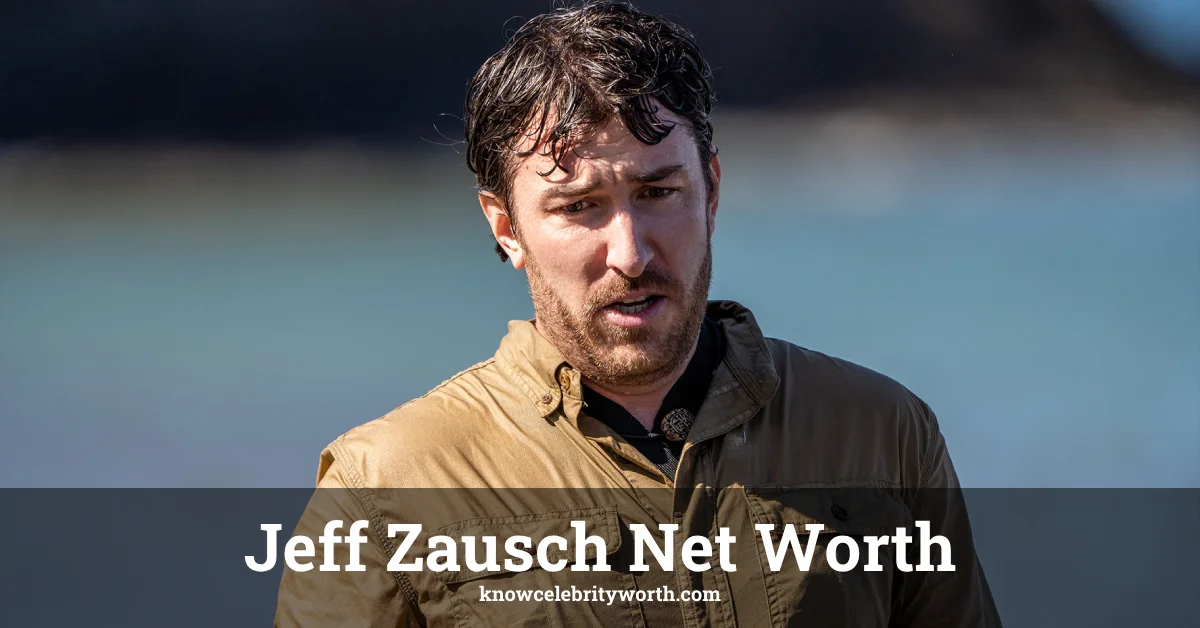Jeff Zausch rose to fame as the barefoot survivalist who conquered extreme challenges on Discovery Channel’s hit show “Naked and Afraid.” While viewers watched him battle harsh elements with nothing but his skills, many wonder how these wilderness adventures translated into financial success. His journey from TV survivalist to public figure offers fascinating insights into reality television economics.
Jeff Zausch Net Worth
As of 2025, Jeff Zausch’s net worth sits between $300,000 and $1 million. This range reflects the often-unpredictable nature of reality TV earnings and the various income streams he’s developed throughout his career.
The wide spread in estimates stems from the private nature of TV contracts and appearance fees. Unlike traditional actors with published salaries, reality stars often negotiate individual deals that remain confidential. What we do know is that “Naked and Afraid” participants reportedly earn base stipends between $5,000 and $30,000 per episode, with veterans like Zausch commanding higher rates.
Jeff’s financial journey began when he first appeared on “Naked and Afraid” in 2014. Since then, his multiple appearances across the franchise have built a steady income foundation. Reality TV stars often negotiate increased pay for return appearances, meaning his compensation likely grew with each challenge he conquered.
Beyond his television salary, Zausch has diversified his income through several channels. He’s developed a social media presence that opens doors to sponsored content and brand partnerships, particularly with outdoor and survival gear companies that align with his public image. These endorsement deals typically range from a few thousand dollars for smaller brands to more substantial five-figure arrangements with major outdoor retailers.
Public speaking engagements represent another revenue stream. With his expertise in survival and resilience, Zausch commands speaking fees at corporate events, survival expos, and adventure conventions. These appearances can bring in $2,000 to $10,000 depending on the event size and his role.
Career as a Survivalist and TV Personality

Jeff’s television career spans over seven appearances across the “Naked and Afraid” franchise, including the original series, “Naked and Afraid XL,” and other spin-offs. This makes him one of the most recurring faces in the franchise’s history.
His career breakthrough came with his initial 21-day challenge in the Himalayan foothills of India. Zausch’s calm demeanor under extreme pressure and his impressive survival skills quickly made him a fan favorite. The Discovery Channel producers recognized his appeal and invited him back for increasingly difficult challenges.
On “Naked and Afraid XL,” the 40-day extended challenge, Zausch demonstrated even greater endurance, further cementing his reputation. These longer format shows typically offer higher compensation, reflecting the increased physical demands and extended filming schedules.
What sets Zausch apart from many reality TV personalities is his authentic expertise. Before television fame, he worked as a technical project manager with genuine survival training. This background gave him credibility that translated into lasting appeal with viewers.
The Discovery Channel relationship proved particularly valuable as it opened doors to additional programming. Beyond the main “Naked and Afraid” franchise, Zausch appeared in related survival content, each appearance adding to his financial portfolio.
Industry insiders estimate that established “Naked and Afraid” cast members like Zausch can earn between $25,000 to $50,000 for a season of the regular show, with “XL” versions potentially doubling that amount. While these figures fall short of mainstream scripted television salaries, they represent significant earnings for showcasing skills Zausch would use regardless of cameras.
Insurance Fraud and Setbacks
Jeff Zausch’s career hasn’t been without complications. In 2015, he faced significant legal troubles when he pleaded guilty to insurance fraud charges in Idaho. Court records showed he filed false claims about stolen items worth thousands of dollars.
This legal issue resulted in a five-year probation sentence and restitution payments that undoubtedly impacted his financial standing. The court ordered Zausch to pay back approximately $8,000 in fraudulent claims, plus additional court costs and fees.
Beyond the immediate financial penalties, the fraud conviction created potential career obstacles. Reality television contracts often include morality clauses that allow networks to terminate relationships based on legal troubles or public controversies. That Zausch continued appearing on Discovery Channel programming suggests either contractual protection or the network’s confidence that the incident wouldn’t damage viewer perception.
The timing of the legal troubles coincided with his rising television career, creating a particularly challenging financial scenario. While earning new income through television, he simultaneously faced legal expenses and restitution payments that reduced his ability to build wealth during these formative career years.
Industry experts note that for reality personalities, reputation management becomes crucial to maintaining income streams. Zausch has largely overcome the negative publicity from the fraud case, focusing public attention on his survival skills and television performances rather than past legal troubles.
The case serves as a reminder that even with growing television income, financial missteps can significantly impact net worth accumulation. For Zausch, the legal issues probably slowed his financial progress during what should have been prime earning years.
Health and Survival Challenges
The physical toll of Zausch’s survival career extends beyond what viewers see on screen. During filming in the Philippines, he developed a near-fatal fever that highlighted the very real dangers survival contestants face. These health emergencies can lead to medical expenses and recovery periods without income.
Reality survival shows place extraordinary demands on participants’ bodies. Zausch has experienced severe weight loss, dehydration, injuries, and exposure to dangerous wildlife across his various challenges. Each physical setback potentially impacts his earning capacity and necessitates recovery time between filming opportunities.
The physical challenges of survival television create a financial paradox for participants like Zausch. The more extreme the conditions they endure, the more compelling their television narrative becomes, potentially increasing their value to producers. However, those same extreme conditions increase health risks that could prematurely end their careers.
Zausch has discussed the lasting physical impacts of his survival experiences, including nutritional deficiencies and immune system challenges. These ongoing health considerations represent both hidden costs of his career choice and potential limitations on longevity in the physically demanding survival entertainment niche.
Smart reality TV personalities understand the physical limitations of their careers and develop transition plans. Zausch has leveraged his expertise into less physically demanding income streams like consulting on survival techniques, creating educational content, and developing relationships with outdoor brands that could outlast his ability to participate in extreme challenges.
Despite these challenges, Zausch’s willingness to push physical boundaries has distinguished him from other survivalists and likely increased his market value. His reputation for completing extraordinarily difficult challenges makes him particularly valuable to producers seeking dramatic and successful survival content.
Zausch’s Business and Brand
Jeff Zausch has strategically expanded beyond television appearances to build more sustainable income sources. Though less visible than his dramatic survival challenges, these business ventures contribute significantly to his overall net worth.
He’s developed educational survival courses that capitalize on his expertise. These instructional programs, offered both online and in-person, allow him to monetize his knowledge directly. Weekend survival workshops can generate $5,000 to $15,000 depending on attendance and location, providing substantial supplemental income between filming schedules.
Zausch has also entered the merchandise space with branded survival gear and apparel. While not reaching the scale of major retail operations, these product lines create passive income streams and further strengthen his personal brand in the survival space.
Social media monetization plays an increasingly important role in his financial portfolio. With substantial followers across platforms, Zausch can earn through sponsored content, affiliate marketing of outdoor products, and partnership deals. Influencers with his following typically command $1,000 to $5,000 per sponsored post, depending on engagement metrics and brand alignment.
Perhaps most valuable long-term is his development of intellectual property. By creating survival techniques, approaches, and content he owns, Zausch builds assets that continue generating revenue regardless of his on-screen appearances. This strategic diversification helps protect against the unpredictable nature of television casting decisions.
Industry analysts note that the most financially successful reality personalities are those who leverage their fame into multiple revenue channels rather than relying solely on appearance fees. Zausch appears to understand this principle, continuously expanding his business portfolio beyond the constraints of television production schedules.
Financial Outlook and Projections
Looking ahead, financial experts project several factors will influence Zausch’s wealth accumulation through 2025 and beyond. The survival entertainment genre continues showing remarkable staying power in the increasingly fragmented media landscape, suggesting ongoing opportunities for established personalities like Zausch.
Streaming platforms have created new distribution channels for survival content, potentially opening additional revenue sources. As networks compete for established talent to anchor new programming, experienced survival experts with proven audience appeal become particularly valuable.
The pandemic paradoxically benefited the outdoor recreation industry, with more Americans seeking wilderness experiences and adventure activities. This trend increases the market for survival expertise, potentially expanding speaking, teaching, and endorsement opportunities for recognized authorities like Zausch.
Financial advisors specializing in entertainment careers suggest that reality personalities with Zausch’s experience typically see plateauing television earnings around the 7-10 year mark but can offset this through diversification. His expansion into education, merchandise, and social media aligns with these best practices for long-term financial growth.
The survival skills market specifically shows promising growth projections, with increased consumer interest in emergency preparedness and self-sufficiency. This expanding market creates natural opportunities for Zausch to leverage his expertise into sustainable revenue streams beyond television.
While specific growth projections remain speculative, industry patterns suggest Zausch could increase his net worth by 20-30% over the next three years through strategic brand expansion, assuming continued television appearances and successful diversification efforts.
Comparing Zausch to Other Reality Survival Stars
View this post on Instagram
Within the survival reality niche, financial outcomes vary substantially based on television longevity, brand development, and business acumen. Zausch’s estimated net worth positions him in the middle tier of survival reality stars.
Bear Grylls represents the upper echelon of financial success in this space, having translated his survival expertise into a reported net worth exceeding $25 million through television deals, books, merchandise, and global speaking engagements. His trajectory demonstrates the extraordinary ceiling possible when survival skills combine with entrepreneurial vision.
Closer to Zausch’s tier, personalities like Cody Lundin and Les Stroud have built estimated net worths between $1-2 million through consistent television work supplemented by books, courses, and speaking engagements. Their careers provide realistic comparison points for Zausch’s potential financial trajectory.
The financial gap between mainstream celebrities and reality survival specialists highlights the niche nature of this expertise. While survival shows draw respectable viewership, they typically lack the massive global audience that generates eight-figure earnings for mainstream entertainment personalities.
Industry patterns suggest that survival experts who successfully transition into broader lifestyle brands achieve greater financial outcomes than those who remain exclusively identified with survival challenges. Zausch’s moves into education and merchandise align with this wealth-building strategy.
When compared specifically against fellow “Naked and Afraid” alumni, Zausch’s multiple appearances and growing business ventures likely place him among the more financially successful participants from the franchise, though still far below the wealth accumulated by the show’s creators and producers.
Conclusion
Jeff Zausch’s financial journey reflects the unique economic realities of reality television careers. From his breakout survival challenges to legal complications and business expansion, his path demonstrates both the opportunities and limitations of transforming wilderness expertise into financial assets.
With a current net worth between $300,000 and $1 million, Zausch has achieved moderate financial success through his television career while facing setbacks that likely prevented greater wealth accumulation. His continued expansion into education, merchandise, and personal branding suggests an understanding of long-term career sustainability beyond camera appearances.
For fans of survival television, Zausch’s story offers fascinating insights into the business realities behind the dramatic wilderness challenges they enjoy watching. While surviving extreme conditions makes for compelling television, translating those survival skills into lasting financial security requires business strategy and brand development that extends far beyond what viewers see on screen.
